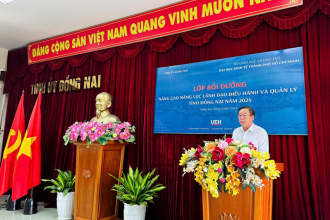
EfD researchers share expertise on green growth with Dong Nai Province officials
The workshop welcomed 40 high-ranking officials, including deputy directors of various departments, district-level People's Committees vice chairpersons, and other key decision-makers from Dong Nai…

Call for Applications: 2025 EAERE Winter School in Resource and Environmental Economics
EAERE Winter School in Resource and Environmental Economics on: Biodiversity Economics Submit your application Deadline: October 31, 2024 University Savoie Mont Blanc, Annecy-le-Vieux, France January…

EfD project features Voluntary Carbon Markets in the Global South
Carbon markets are increasingly being recognized as an important instrument to reduce global emissions. EfD is conducting a comprehensive study on Exploring the potential and challenges of setting up…
Spatial analysis of technical efficiency in the provision of local public goods: The case of Chilean mining municipalities
Countries with intensive mineral extraction generate resource windfalls for municipalities to improve population's welfare in mining areas. However, this process may be inefficient due to negative incentives inherent in their administration, moving away from the actual objective of these resources. This study analyzes the level of technical efficiency over the provision of public goods, namely public education and well-being in Chilean municipalities using a panel approach.

Farmer-herder conflicts have consequences on food security in Nigeria
The risk of violence that rural households perceive affects their agricultural output and economic welfare. EfD Researcher and WinEED member Amaka Nnaji , and co-authors have studied the consequences…
Wheeling into school and out of crime: Evidence from linking driving licenses to minimum academic requirements
“No Pass No Drive” (NPND) laws revoke or deny driver’s licenses to minors who drop out of school, are frequent truants, exhibit behavioral issues, or perform poorly academically. By analyzing Federal Bureau of Investigation (FBI) arrest data and leveraging state, time, and cohort variations, the researchers find that NPND laws are linked to a significant reduction in total crime, DUI, and property crimes among males aged 16 to 18, as well as a decline in DUIs among females in the same age group.

Study analyzes Senegal's gender mainstreaming efforts in energy access
A new study has shed light on the challenges and successes of Senegal's National Action Plan to integrate gender equality into its energy policies by examining the political and economic factors…

EfD Kenya hosts pivotal discussions on clean energy and transport in East Africa
Nairobi will be the epicenter of policy discussions at the EfD Policy Day 2024 on October 2. The event, held in conjunction with EfD’s Annual Meeting, will bring together policymakers, researchers…

Tanzania IGE Fellows in comprehensive training on policies for Inclusive Green Economy
A two-day intensive training program on the Inclusive Green Economy (IGE) in Practice was held on September 18-19, 2024, at the University of Dar es Salaam. This training aimed to equip senior civil…
Pagination
- Previous page
- Page 12
- Next page
